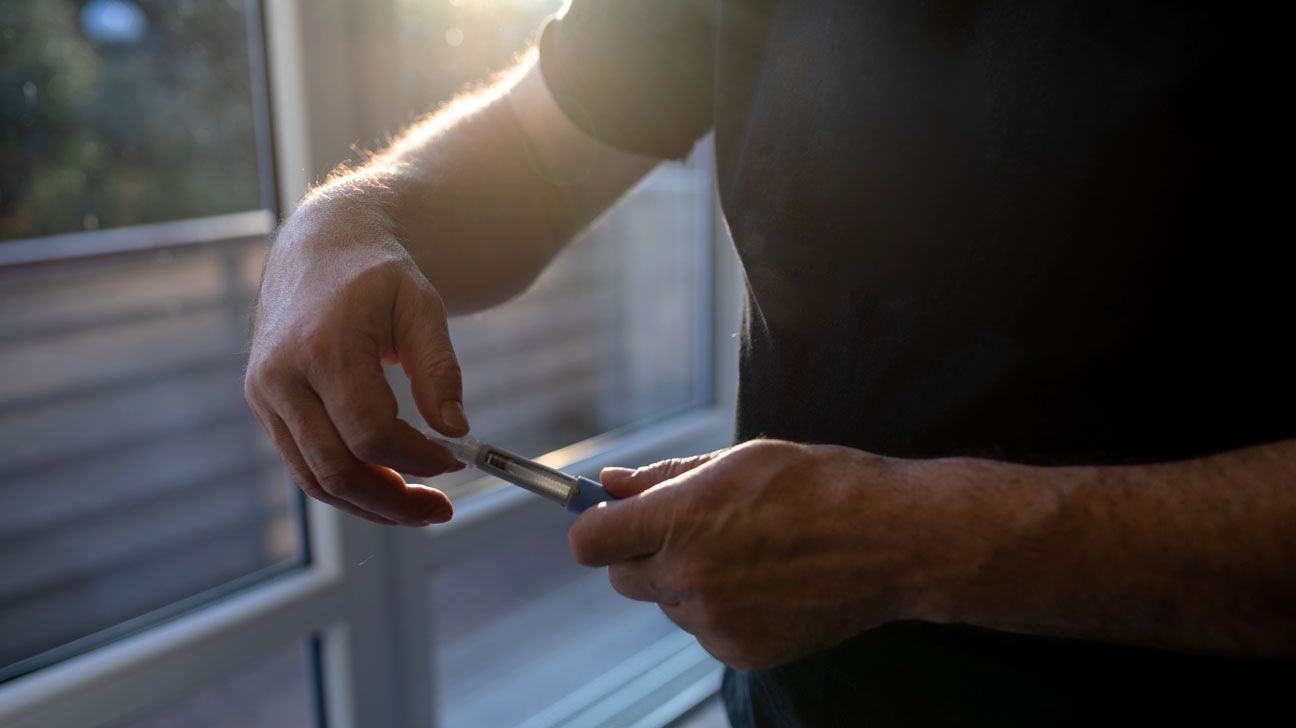
- New research shows that GLP-1 medications are associated with improved testosterone in males with obesity or type 2 diabetes.
- The findings align with prior evidence showing that weight loss can support healthy testosterone levels.
- Obesity and type 2 diabetes are recognized as comorbidities for low testosterone and sexual dysfunction.
GLP-1 medications can help improve low testosterone in males with obesity or type 2 diabetes, new research suggests.
Testosterone is a key hormone involved in functions ranging from sexual health to muscle development. While various factors influence testosterone levels, obesity and type 2 diabetes are both recognized risk factors for low testosterone.
Researchers have already shown that weight loss improves testosterone levels through lifestyle modifications and treatments such as bariatric surgery.
GLP-1 drugs, a class of obesity and diabetes medications that includes Ozempic, Wegovy, Zepbound, and Mounjaro, are known to produce significant weight loss. However, their effects on testosterone levels hadn’t yet been studied.
“We found that men treated with GLP-1–based weight loss therapies, such as semaglutide, dulaglutide, and tirzepatide, experienced significant increases in both total and free testosterone levels,” said Shellsea Portillo Canales, MD, first author of the study and endocrinologist at SSM Health St. Louis University Hospital.
“These findings suggest that in men with obesity or type 2 diabetes, incretin-based therapy may help restore healthy testosterone levels, particularly when low testosterone is related to obesity,” she told Healthline.
Portillo Canales presented her research on July 14 at ENDO 2025, the Endocrine Society’s annual meeting in San Francisco, California. The study has not yet been published in a peer-reviewed journal.
The findings are not surprising, but they help to answer an important, unanswered question about GLP-1 drugs and sexual health.
“This preliminary study fills a nice gap in the research in this area,” said David B. Sarwer, PhD, director of the Center for Obesity Research and Education, Temple University, and a spokesperson for the Obesity Society who wasn’t involved in the research.
“It adds to a rapidly growing evidence base suggesting that these medications, in addition to promoting clinically significant weight loss, also have a wide range of secondary health benefits,” he said.
Portillo Canales and her team conducted a retrospective study of people with obesity and type 2 diabetes using electronic health records to investigate the effects of GLP-1 drugs on testosterone over an 18-month period.
The study included 110 males, most of whom were white and in their mid-50s. Their average body mass index (BMI) was 35, meeting the threshold for clinical obesity, and 86 had type 2 diabetes. Subjects were excluded if they had received testosterone or other androgenic therapies.
At baseline, just over half of the men had total testosterone levels above 300 nanograms per deciliter (ng/dL).
According to the American Urological Association, any value below this threshold indicates low testosterone. After 18 months on GLP-1 receptor agonists, the proportion of men with healthy testosterone rose to 77%.
The average participant lost about 26 pounds, decreasing from 255 to 229 pounds or approximately 10% of their body weight. Concurrently, total testosterone increased by about 18% (from 322 to 380 ng/dL), while free testosterone rose by 17%.
“This tracks with what we would expect based on how weight loss affects testosterone concentrations,” said Beverly Tchang, MD, an endocrinologist and obesity medicine specialist at Weill Cornell Medicine. Tchang wasn’t involved in the study.
Other interventions that produce substantial weight loss — such as bariatric surgery — have likewise been associated with improved testosterone levels and overall hormonal balance.
While there is no evidence that GLP-1 medications stimulate testosterone production directly, the increase in testosterone driven by their weight-loss effects appears comparable to that of other weight loss strategies.
Low testosterone (low-T) in males occurs when the testicles do not produce enough testosterone. Signs of low testosterone in men include:
- low sex drive (libido)
- decreased muscle mass
- erectile dysfunction
- lethargy/low energy
- increased body fat
The most serious form of low-T is known as pathologic hypogonadism, and indicates a persistent reduction in testosterone levels caused by an irreversible condition. However, in many cases, testosterone levels can be corrected through both lifestyle and medical interventions.
Obesity-related low testosterone is one such case.
“We know obesity is associated with ‘pseudo’ hypogonadism — not pathological. Obesity, due to excess adiposity, can affect the hypothalamic-pituitary-testicular axis. In essence, brain centers are lowering testosterone in obesity,” said Sun Kim, MD, an associate professor of Endocrinology at Stanford Medicine who wasn’t involved in the research.
In fact, obesity and low testosterone can create a sort of positive feedback loop: obesity lowers testosterone, which in turn can lead to less muscle mass, which can lead to further weight gain.
“Muscle mass is one of our biggest drivers of our metabolism. So, when you have low testosterone and you have this reduced ability to build muscle, then that slower metabolism predisposes you to more weight gain,” said Tchang.
In addition to being a powerful agent for weight loss, GLP-1 drugs also have meaningful downstream effects on testosterone. Kim suggested that, given these effects, people with obesity who are considering hormone replacement therapy for low-T should first consider weight loss.
“Men with obesity with low testosterone (not due to other causes) should prioritize weight loss to increase testosterone versus taking exogenous testosterone,” she said.
While the findings are preliminary, experts are excited by the possibility of the role that GLP-1 medications could play in improving sexual health.
“Anecdotally, we’ve heard of some people coming back, men specifically, saying that GLP-1s have helped their libido and sexual performance,” Tchang said.
“If these drugs have an added benefit on the testosterone side, along with healthier blood vessels or more blood flow, then we’re looking at a medication that’s really starting to become a sexual health aid as well.”
Sarwer told Healthline that this latest study adds evidence of yet another health benefit from GLP-1 drugs.
“Over the past several years, we have seen a great deal of enthusiasm about the use of incretin therapies to promote weight loss much larger than those seen with caloric restriction and increased physical activity,” he said.
“This weight loss has downstream effects on a range of important health issues. This study suggests that we may soon be able to confidently add increased testosterone to that list.”
Source link : https://www.healthline.com/health-news/glp-1-drugs-may-improve-low-testosterone
Author :
Publish date : 2025-07-16 06:06:00
Copyright for syndicated content belongs to the linked Source.








